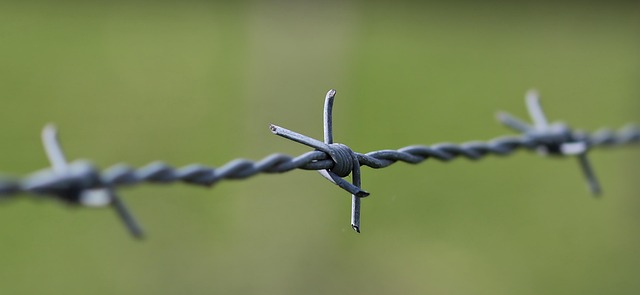In New Bedford, MA, homeowners and property managers are increasingly looking to eco-friendly fencing options to enhance their outdoor spaces while also contributing to a more sustainable environment. This article explores the diverse array of green fencing materials available, delving into their benefits, durability, and positive impact on local ecosystems. We’ll compare traditional fencing solutions with eco-conscious alternatives, providing insights into cost analysis and guiding readers in selecting the perfect, nature-inspired fence for their properties.
- Understanding Eco-Friendly Fencing Options in New Bedford
- Benefits of Sustainable Fencing Materials for Your Property
- Natural Fence Materials: Biodegradable and Durable Alternatives
- How Eco-Friendly Fences Enhance Local Ecosystems
- Cost Analysis: Traditional vs. Green Fencing Solutions
- Choosing the Right Eco-Conscious Fence for Your Home
Understanding Eco-Friendly Fencing Options in New Bedford
In New Bedford, MA, understanding eco-friendly fencing options is more than just a trend—it’s a conscious choice to enhance local biodiversity and mitigate environmental impact. The city, with its diverse landscapes, from urban neighborhoods to coastal areas, requires fencing materials that not only stand the test of time but also respect the natural ecosystem. Eco-friendly fencing options cater to these needs by offering alternatives to traditional materials like wood and vinyl. These include recycled plastic, composite, and organic materials, each with unique benefits such as reduced maintenance, longevity, and minimal environmental disruption during production.
New Bedford residents and local businesses can play a significant role in fostering an eco-conscious community by opting for these sustainable fencing solutions. By choosing materials that are free from harmful chemicals and easily recyclable, they contribute to the city’s overall sustainability goals. Moreover, these options often provide aesthetic appeal, blending seamlessly with natural surroundings, thus enhancing property values while promoting environmental harmony.
Benefits of Sustainable Fencing Materials for Your Property
Adopting eco-friendly fencing materials offers numerous advantages for New Bedford, MA property owners. These sustainable options not only contribute to a greener environment but also enhance the overall aesthetics and value of your home or business. One of the key benefits is their longevity; natural, non-toxic materials are resistant to rot, rust, and pests, ensuring they stand strong against harsh weather conditions without requiring frequent replacement.
Additionally, sustainable fencing reduces environmental impact by minimizing waste and conserving natural resources. These materials often come from renewable sources or recycled content, lowering your carbon footprint. Moreover, eco-friendly fences provide insulation, helping regulate temperatures in New Bedford’s diverse climate, which can lead to energy savings over traditional fencing options.
Natural Fence Materials: Biodegradable and Durable Alternatives
In New Bedford, MA, homeowners and property managers are increasingly turning to natural fence materials for both aesthetic and environmental reasons. These biodegradable alternatives offer a durable and sustainable solution compared to traditional synthetic fencing. Materials like bamboo, recycled plastic, and organic wood composites not only reduce carbon footprints but also provide long-lasting performance, resisting rot, pests, and extreme weather conditions. Their eco-friendly nature makes them an attractive option for those looking to minimize their environmental impact while enhancing the beauty of their outdoor spaces.
How Eco-Friendly Fences Enhance Local Ecosystems
Eco-friendly fences, made from sustainable materials like bamboo, recycled plastic, or organic wood, play a significant role in enhancing local ecosystems. These fencing options offer a natural barrier that supports biodiversity by providing habitat and shelter for various wildlife species. In New Bedford, MA, where diverse plant and animal life thrives, the installation of such fences can create safe spaces for birds, small mammals, and even insects, contributing to a thriving ecosystem.
Moreover, these eco-friendly materials are designed to minimize environmental impact. They reduce pollution and carbon footprint compared to traditional fencing made from synthetic or non-sustainable resources. By choosing these options, homeowners and local authorities can play a part in preserving the area’s natural beauty while promoting ecological balance and biodiversity conservation.
Cost Analysis: Traditional vs. Green Fencing Solutions
When considering fencing options for your New Bedford property, a cost-benefit analysis between traditional materials and eco-friendly alternatives is essential. While wooden or vinyl fences might be more readily available and affordable initially, green fencing solutions offer long-term savings and environmental advantages. Traditional fencing often requires frequent maintenance, repainting, or replacement due to rot, peeling, or fading, adding up to significant expenses over time.
In contrast, eco-friendly materials like recycled plastic, bamboo, or composite options are durable, low-maintenance, and designed to withstand various weather conditions. While the upfront costs may be slightly higher, these green solutions pay off through reduced longevity, lower replacement frequencies, and minimal environmental impact. Additionally, many local governments in Massachusetts offer incentives for using sustainable fencing materials, further offsetting installation and maintenance expenses.
Choosing the Right Eco-Conscious Fence for Your Home
When considering an eco-friendly fence for your New Bedford, MA home, it’s essential to evaluate your specific needs and preferences while keeping environmental impact in mind. Different materials offer various benefits—from superior durability to aesthetic appeal and reduced maintenance. For instance, recycled plastic and wood composites are popular choices due to their long-lasting nature and resistance to rot and pests. These materials also save energy during manufacturing compared to traditional wooden or metal fences.
On the other hand, natural materials like bamboo or organic hemp offer a unique look and excellent sustainability, though they may require more upkeep. Living fences, featuring fast-growing plants or hedges, provide privacy and ecological benefits while remaining dynamic and low-maintenance. Understanding these options will help guide your decision towards a fence that not only enhances your property but also contributes to a greener New Bedford community.
